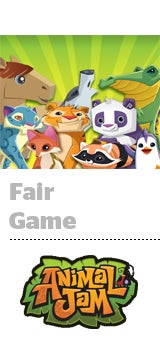 Monetizing an app is never child’s play, but it becomes even more difficult if the app in question is aimed at children.
Monetizing an app is never child’s play, but it becomes even more difficult if the app in question is aimed at children.
Clark Stacey, CEO of game publisher WildWorks, knows about those challenges firsthand. Wildworks, which recently rebranded from Smart Bomb Interactive, has been working in close collaboration with the National Geographic Society since 2010 on Animal Jam, a wildly popular multiplayer web-based virtual world for kids with more than 20 million players around the world. Players spend roughly 75 minutes with the game per session.
The target demo for Animal Jam – which takes place in a fictional interactive universe called Jamaa, where kids can become avatars of their favorite animals while they learn about nature, science and ecology – is largely girls, ages 7 to 9. That’s not an age group that generally has ready access to a credit card, as they shouldn’t, which is why Animal Jam has to get creative.
The game is gearing up to launch a full-scale mobile experience for iOS and Android tablets early next year with a new spin on monetization – educational content.
“With virtual currency, kids just blow through it, especially when they’re on the younger side – they might be spending $1,000 of real money on virtual crunchberries or something,” Stacey said. “Monetizing an app for kids is pretty easy to do – doing it ethically is what’s hard.”
Each avatar a player downloads will be accompanied with a National Geographic ebook with more information about that particular animal. Animal Jam is working with National Geographic to produce the ebooks and related videos and multimedia content.
The basic version of Animal Jam is free to play, but users, with the permission of a parent, can sign up on a monthly subscriptions basis for access to additional animal avatars and accessories.
Animal Jam may be free, but it doesn’t operate on a classic freemium hook-’em-in-and-bleed-’em-slowly-dry model.
“We’ve found that one of the most popular conversion tools for our subscriber base are our avatar animals,” Stacey said. “If parents buy their child a wolf avatar and then their kid stops playing Animal Jam six months later, they can keep the related ebook. Even after our game passes out of their favorites, kids will still have something they can actually use. It’s a unique value proposition for parents.”
Although Animal Jam works with affiliate networks like Commission Junction and blogs like BlogHer to get the word out and has even experimented with YouTube pre-roll, there is no advertising in the web version of Animal Jam, and Stacey said he plans to keep it that way in the forthcoming mobile app.
“We’re seeing more and more kid games out there that have entirely ad-supported businesses models, but we haven’t gone down the in-app advertising route,” he said. “We consider it part of our covenant with parents to not try and sell their kids cereal or something like that.”
WildWorks is clearly doing something right with Animal Jam – revenue for the game will be about $30 million this year – but user acquisition in the kid community is far from easy, let alone complying with legislation like COPPA.
“Kids are extremely difficult to reach on the web and just as much so on mobile, because most of the places you would generally go to get authentic and legitimate installs would be social networks, and young children probably shouldn’t be on there,” Stacey said.
In preparation for the big mobile push planned for Q1 2015, Animal Jam tested a stripped down iPad app last December that enabled players to generate gems for their Animal Jam accounts. “We generated hundreds of thousands of downloads over a single weekend just by announcing the app on Animal Jam,” Stacey said.
But Stacey and his team envision what he called a “slow burn” for the coming launch of Animal Jam’s full mobile experience.
“We’re not looking to push this quickly up the charts,” Stacey said. “Of course there will be some typical in-app purchases available, but it’s not going to just be about buying another avatar. We’re not focusing on the currency. Our bread and butter is not about monetizing a currency that kids can spend in the game. Our focus is on parent-approved purchases that have educational value tied to them.”













